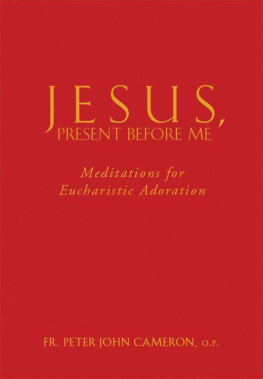Eucharistic Adoration
Reflections in the Franciscan Tradition
Franciscan Sisters of Perpetual Adoration
RESCRIPT
In accord with the Code of Canon Law, I hereby grant my permission to publish Eucharistic Adoration: Reflections in the Franciscan Tradition by the Franciscan Sisters of Perpetual Adoration.
Most Reverend Joseph Binzer
Vicar General and Auxiliary Bishop
of the Archdiocese of Cincinnati
Cincinnati, Ohio
December 14, 2011
The permission to publish is a declaration that a book or pamphlet is considered to be free from doctrinal or moral error. It is not implied that those who have granted the permission to publish agree with the contents, opinions or statements expressed.
Excerpts from Clare of Assisi: Early Documents used with permission by the Franciscan Institute, St. Bonaventure, New York. All rights reserved.
Scripture passages have been taken from New Revised Standard Version Bible, copyright 1989 by the Division of Christian Education of the National Council of the Churches of Christ in the U.S.A., and used by permission. All rights reserved.
Cover and book design by Mark Sullivan
Cover image copyright fotolia | zatletic
Library of Congress Cataloging-in-Publication Data
Eucharistic adoration : reflections in the Franciscan tradition / Franciscan Sisters of Perpetual Adoration.
p. cm.
Includes bibliographical references (p. ) and index.
ISBN 978-1-61636-325-3 (alk. paper)
Lords SupperAdoration. 2. Franciscans. I. Franciscan Sisters of Perpetual Adoration (La Crosse, Wis.)
BX2233.E834 2012
264.02036dc23
2011048752
PRINT ISBN 978-1-61636-325-3
E-BOOK ISBN 978-1-61636-474-8
Copyright 2012, by Franciscan Sisters of Perpetual Adoration . All rights reserved.
Published by St. Anthony Messenger Press
28 W. Liberty St.
Cincinnati, OH 45202
www.AmericanCatholic.org
www.SAMPBooks.org
Printed in the United States of America.
Printed on acid-free paper.
12 13 14 15 16 5 4 3 2 1
Contents
Introduction
Reflections
Bibliography
. . . . .
The committee that directed the
creation of the book were:
Jolynn Brehm, fspa ,
Linda Mershon, fspa ,
Julia Walsh, fspa ,
and
Joan Weisenbeck, fspa .
In the Sacramental Presence
In the daily Eucharist we become the body of Christ.
We leave the daily Eucharist to be in communion with all human persons,
with all Gods creation, to link with each other, to be the body of Christ.
Perpetual adoration is a continuation of the communion of the Eucharist.
No one of us prays alone; there are always at least two of us.
Always, we honor God in the Sacramental Presence
not only for ourselves, but for our community,
for all those for whom and with whom we minister,
for those who minister to us, for the world community.
In the presence of the Eucharistic Christ, we are fed over and over again;
we are sent over and over again.
In perpetual adoration, we honor, we beg, we thank, we receive,
we minister, we fail, we forgive, we are forgiven,
we are joined in the Loving Presence of God.
Perpetual adoration is a challenge to us to live as we pray:
to live in complete acceptance as Jesus does in the Sacramental Presence;
to work gently, yet strongly against the violence of worldly power;
to live in simplicity in order to feed the world;
to glory in the splendor of our chapel,
but go out to relieve the degradation of the poor;
to live in trust and surrender;
to work to attain justice by recognizing injustice;
to love others as God loves.
by Helen Koopmann, fspa
Introduction
Marlene Weisenbeck, fspa, and Joan Weisenbeck, fspa
The Franciscan Sisters of Perpetual Adoration promised their fidelity to Christ in the Blessed Sacrament through a ritual lighting of fire in a humble dish containing lard and a tissue wick. It was all they had when Mother Antonia promised to establish perpetual adoration in 1865. Even today, our hearts are burning within us as we continue to fulfill that promise.
The fire of Gods love in our Franciscan tradition is most evidenced in St. Francis constant adoration. In every church he visited Francis prayed: We adore You, Lord Jesus Christ, in all Your churches throughout the world, and we bless You, because by Your holy cross You have redeemed the world!
St. Clare followed this intense desire for oneness with the sacrament of the Eucharist. As witnesses of Christs abiding presence, the Poor Ladies nurtured the feeble faith of commoners, nobles, and outcasts alike. Clare urged her companions to discover the fullness of love by basking in divine light and to become living icons of God.
St. Clare of Assisi does not give us a set of prayers that she created, but in her writings we discover her spirituality and her path to God. She invites us to gaze, consider, contemplate, and imitate Christ. Clare gazes on all of creation because it has the potential to speak to her of God. She considers the experiences of her life in the light of the Gospels. She contemplates the crucified and glorified Christ and opens herself to be transformed by the Divine One who loves her. She deeply desires to imitate the One she loves to become the image of the Word of Love.
Images of Clare portray her holding the monstrance of the Eucharist, lifting Christ up for all to see. She shows the Most High God to the world. Her vision of Christ is the brilliance of eternal light / and the mirror without blemish. The purpose of her contemplative prayer is to draw as close as she can to God incarnate so that ultimately she can discover her own unity with God. Then, in her words, we can taste the hidden sweetness that, from the beginning, God Himself has reserved for His lovers.
Adore the Lord Ceaselessly
Following Christ in the footsteps of Francis and Clare of Assisi, in 1849 fourteen secular Franciscans from Bavaria, Germany, arrived in Milwaukee, Wisconsin, with the intention to found a religious order and serve the immigrants. This religious order became known as the Franciscan Sisters of Perpetual Adoration and was the first religious congregation to establish perpetual adoration in the United States.
In 1865, Mother Antonia in a solemn vow made a promise that, if God would bless the community of sisters, the community would establish perpetual adoration and build a chapel as beautiful as their means would allow. On August 1, 1878, perpetual adoration of the Blessed Sacrament was established in La Crosse, Wisconsin, and has continued uninterrupted to this day. The pledge emanated from the faith of the communitys founders in Bavaria, where perpetual adoration had begun in 1674.
This book of reflections witnesses how we, Franciscan Sisters of Perpetual Adoration (FSPA) La Crosse, Wisconsin, come before the Eucharist each hour, every day and night, to gaze, consider, contemplate, and imitate Christ. We seek to become like the One we contemplate and to continually make room for the mystery of God within our lives. We invite you to do the same.
Francis of Assisi, The Testament, in The Saint, vol. 1 of Francis of Assisi: Early Documents, Regis J. Armstrong, o.f.m. cap ., J.A. Wayne Hellmann, o.f.m. conv. , and William Short, o.f.m., eds. (New York: New City, 1999), pp. 124125 .
Clare of Assisi, The Fourth Letter to Agnes of Prague, in Clare of Assisi: Early Documents , Regis J. Armstrong, o.f.m. cap., ed. and trans. (St. Bonaventure, N.Y.: Franciscan Institute, 1993), p. 50. Hereafter referred to as CA:ED.
Clare of Assisi, The Third Letter to Agnes of Prague, CA:ED , p. 45.
| Essential Sustenance
Jean Amlaw, fspa affiliate
Gaze
By day they go into towns and villages in order to win others by setting them an example. At night they retire to some hermitage or lonely place and give themselves to meditation.
Next page





